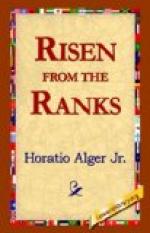“Yours respectfully,
“PAULINE CLINTON.”
Fletcher read this letter with feelings which can better be imagined than described. He had already written home in the most boastful manner about the invitation he had received, and he knew that before he could contradict it, it would have been generally reported by his gratified parents to his city friends. And now he would be compelled to explain that he had been duped, besides enduring the jeers of those who had planned the trick.
This was more than he could endure. He formed a sudden resolution. He would feign illness, and go home the next day. He could let it be inferred that it was sickness alone which had compelled him to give up the idea of appearing as a public reader.
Fitz immediately acted upon his decision, and the next day found him on the way to Boston. He never returned to the Prescott Academy as a student.
CHAPTER XXV.
AN INVITATION TO BOSTON.
Harry was doubly glad that he was now in receipt of a moderate salary. He welcomed it as an evidence that he was rising in the estimation of his employer, which was of itself satisfactory, and also because in his circumstances the money was likely to be useful.
“Five dollars a week!” said Harry to himself. “Half of that ought to be enough to pay for my clothes and miscellaneous expenses, and the rest I will give to father. It will help him take care of the rest of the family.”
Our hero at once made this proposal by letter. This is a paragraph from his father’s letter in reply:—
“I am glad, my dear son, to find you so considerate and dutiful, as your offer indicates. I have indeed had a hard time in supporting my family, and have not always been able to give them the comforts I desired. Perhaps it is my own fault in part. I am afraid I have not the faculty of getting along and making money that many others have. But I have had an unexpected stroke of good fortune. Last evening a letter reached your mother, stating that her cousin Nancy had recently died at St. Albans, Vermont, and that, in accordance with her will, your mother is to receive a legacy of four thousand dollars. With your mother’s consent, one-fourth of this is to be devoted to the purchase of the ten acres adjoining my little farm, and the balance will be so invested as to yield us an annual income of one hundred and eighty dollars. Many would think this a small addition to an income, but it will enable us to live much more comfortably. You remember the ten-acre lot to the east of us, belonging to the heirs of Reuben Todd. It is excellent land, well adapted for cultivation, and will fully double the value of my farm.




